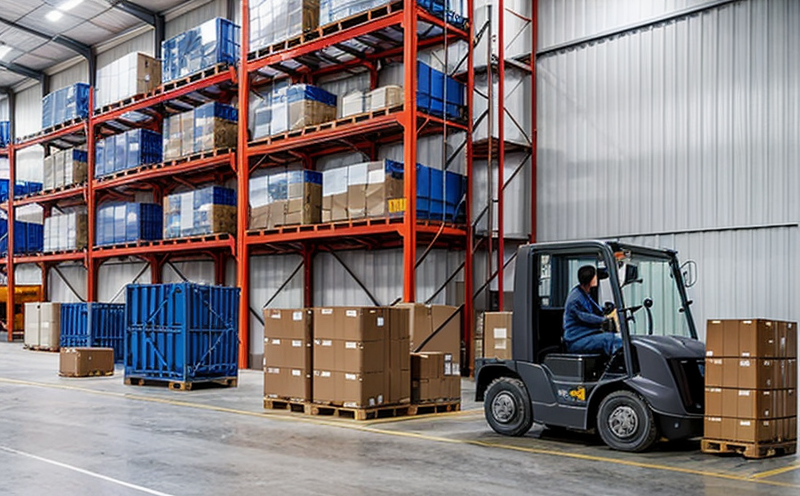MIL-STD-810 Environmental Compliance Testing of Aerospace Equipment
The Military Standard MIL-STD-810 is a comprehensive set of environmental testing requirements designed to ensure that military equipment, including aerospace components and systems, can withstand the harsh operational environments encountered in service. This standard addresses various environmental factors such as shock, vibration, temperature extremes, humidity, rain, sand, dust, salt spray, and more.
The Aerospace & Aviation sector relies heavily on MIL-STD-810 compliance to ensure that all packaging and logistics systems used for transporting critical equipment meet the highest levels of reliability and durability. This service is crucial not only in ensuring product integrity but also in enhancing safety and operational readiness.
Our laboratory adheres strictly to the requirements outlined in MIL-STD-810, providing a full range of testing services that include shock and vibration testing, thermal testing, humidity and rain exposure, as well as sand and dust ingress tests. These tests simulate real-world conditions under which aerospace equipment might be deployed.
For our clients, this means peace of mind knowing their products are rigorously tested to meet stringent military standards. This service is particularly important for quality managers, compliance officers, R&D engineers, and procurement professionals who must ensure that all materials used in packaging and logistics systems meet the necessary environmental requirements.
The testing process begins with detailed consultation between our technical experts and your team to understand specific needs and constraints. From there, we can tailor a comprehensive test plan that ensures thorough coverage of all relevant MIL-STD-810 categories. Our state-of-the-art facilities include specialized chambers for thermal cycling, humidity control, vibration simulation, and more.
The testing process itself involves precise specimen preparation, rigorous adherence to the prescribed test parameters, and the use of advanced instrumentation to capture accurate data throughout each phase of the test. Once completed, our engineers analyze the results in detail before providing a comprehensive report outlining findings and recommendations for improvement where necessary.
Scope and Methodology
| MIL-STD-810 Categories Tested | Description |
|---|---|
| Category I: Humidity, Rain, Snow, Ice, Fog, Dew | This category covers tests for moisture-related environmental factors that can affect aerospace equipment during transport or deployment. |
| Category II: Temperature and Humidity Combinations (Thermal Cycling) | These tests simulate the effects of varying temperatures combined with humidity levels on materials used in packaging and logistics systems. |
| Category III: Sunlight, Rain, and Dust | This category includes exposure to sunlight followed by rain or dust, simulating conditions found during transportation through various climates. |
| Category IV: Salt Fog, Marine Environments, Humidity Cycling with Condensation | The focus here is on ensuring that packaging and logistics systems can withstand environments rich in salt content such as coastal areas. |
| Category V: Mechanical Shock | These tests assess how well materials and components will survive sudden impacts during transport or deployment. |
| Category VI: Vibration | Vibration testing evaluates the ability of packaging systems to protect contents from damage due to vibration encountered in transit. |
| Category VII: Acoustic Environment (Sound Power Level) | This category assesses how well materials and components can withstand acoustic environments, which is crucial for electronic equipment. |
| Category VIII: Sand and Dust | Testing in this category ensures that packaging systems are capable of protecting contents from sand and dust ingress during transit. |
| Category IX: Operational Mechanical Environment (OME) | This includes tests designed to simulate the operational environment under which aerospace equipment will be used, including altitude variations. |
The methodology for each test category follows strict international standards such as MIL-STD-810. Our technicians use calibrated equipment and adhere meticulously to prescribed protocols to ensure accurate results.
Eurolab Advantages
At Eurolab, we offer a wide range of services that go beyond just testing; we provide comprehensive support throughout the entire process from initial consultation through final report delivery. Our experienced team ensures that every aspect of your project receives personalized attention tailored specifically to meet your unique requirements.
- Expertise: Our technical staff have extensive experience in aerospace and aviation industries, allowing us to provide highly specialized testing solutions.
- State-of-the-Art Facilities: We utilize cutting-edge technology including climate-controlled chambers, vibration tables, and acoustic test facilities.
- Rigorous Quality Control: All tests are conducted with precision and accuracy ensuring reliable results every time.
- Prompt Reporting: Once testing is complete, our analysts compile detailed reports promptly so you can act on the findings immediately if needed.
- Compliance Assurance: We ensure that all tests meet or exceed MIL-STD-810 requirements ensuring your products are fully compliant with industry standards.
We pride ourselves on delivering exceptional service while maintaining the highest ethical standards. With us, you can trust that every step of the testing process is conducted with care and attention to detail.
Customer Impact and Satisfaction
- Enhanced Product Reliability: By ensuring packaging and logistics systems meet MIL-STD-810 requirements, we help increase product reliability and reduce operational risks.
- Simplified Compliance: Our services simplify the compliance process for our customers by handling all aspects of testing in-house.
- Cost Efficiency: By identifying potential issues early on through thorough testing, companies can avoid costly reworks later down the line.
- Better Decision Making: Accurate test results enable better-informed decisions regarding product design and manufacturing processes.
- Improved Customer Confidence: Meeting MIL-STD-810 ensures that your products meet or exceed industry expectations, thereby enhancing customer confidence in their quality.
- Competitive Advantage: By demonstrating compliance with stringent military standards, companies can differentiate themselves from competitors and gain a competitive edge.
Our clients consistently report high levels of satisfaction with our services. They appreciate the thoroughness and professionalism provided by our team as well as the detailed insights offered in our reports which help guide decision-making processes within their organizations.





